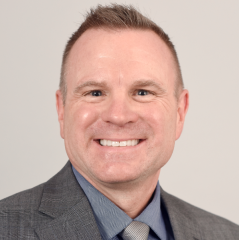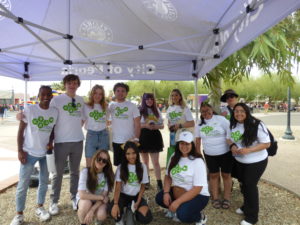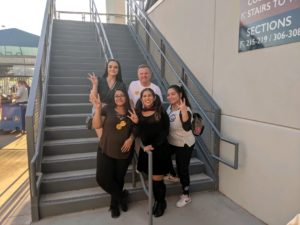
This week we are excited to highlight one of our exceptional faculty members, Dr. Gregory Broberg! With an extensive background as an elementary and middle school teacher, Greg has cultivated a passion for educational equity, focusing on how to best support the unique needs of students. Before he was a teacher, he worked in various capacities in the juvenile court, including being a Court Appointed Special Advocate. Dr. Broberg is with the ASU School of Social Transformation as a Justice & Social Inquiry faculty member and Senior Lecturer.
Dr. Broberg has worked with the City of Peoria on several projects, including a community placemaking study, community COVID needs assessment, and most recently, a community engagement study. For the placemaking project, students from his JUS 305 Principles of Justice course were split into groups and positioned throughout three geographic areas in the City of Peoria where they surveyed citizens to find out what they wanted in placemaking. The Peoria COVID needs assessment focused on community-based organizations and their response to COVID-19. Students from his JUS 385 Justice and Everyday Life course were responsible for interviewing the organization in focus groups to gather feedback and provide recommendations for how Peoria can support its community organizations. In a more recent collaboration with the City of Peoria, students from JUS 301 Research Methods worked with the Peoria Communications department to design strategies for Peoria's "hard to reach" residents.

Question: Prior to working with Project Cities, what has been your experience with project-based learning?
Answer: “My work related to project-based learning early on, was I would say, very limited. I tried a lot in courses to provide real world experiences, so getting students to look at problems that happened in society, but not necessarily to the level that Project Cities does. It’s a really unique program in that it places students in that role of working on real world problems. Within the classroom, you can talk about and look at the issues, so you can teach them how to do research qualitatively and quantitatively looking at social problems, but it’s not the same as having to get in there and actually listen to municipal stakeholders…I remind students all the time, you need to understand what goes on locally because this is what affects citizens.”
Question: Were there any standout experiences with the program, maybe with specific students on one of the reports, or group of students work that really blew you away?
Answer: As part of the Peoria placemaking report, several students from Greg's class went to a Peoria Halloween event to meet with residents. Dr. Broberg was amazed by how engaged the students were with the event and how connected they felt with the city. Also, during the report writing, students were so engaged with the data that they had collected that they wanted to expand on the work, “They just connected so much into placemaking, and I do hear every once in a while, from them, they’ll ask me, well, how should I put this on my resume, and so I get a little blurb to put on it and things of this nature. I know it’s meaningful for them.”

Question: Do you have any last thoughts?
Answer: Greg urges other scholars to take advantage of opportunities, like Project Cities, to really make a difference in students experience at ASU. He points out that not only is it valuable for the students, but the time investment into making these projects happen is worth it as an academic and teacher, “If we can get more municipalities in the state involved in this, I think it will just grow programs so much more, and our students will become more practitioners than just taking coursework.”
Project Cities is a member of the Educational Partnerships for Innovation in Communities Network (EPIC-N) and is administered by ASU’s Julie Ann Wrigley Global Futures Laboratory and the Sustainable Cities Network. Stay up to date with Project Cities and the Sustainable Cities Network by following us on social media or subscribing to our newsletter.